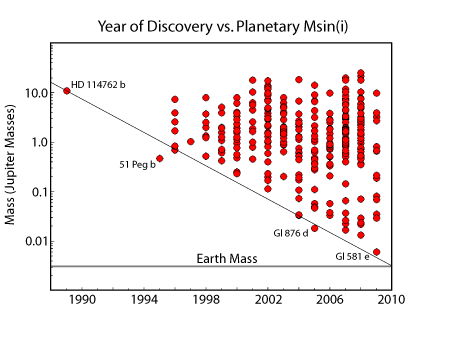
It’s gratifying to see that Gliese 581 e lands right on a trend line that’s held up for over two decades and a factor of two thousand in planetary mass. It’s amazing that within a year, we’ll be in possession of genuinely Earth-mass planets orbiting nearby stars.

Exoplanetary science has been in high gear now for fifteen years; the first Earth-mass planets are a big-picture milestone, on par with the discoveries of 51 Peg b, Ups And c and d, HD 209458 b and Gliese 876 d. Even more significantly, I think that an Earth-mass planet on the books is going to catalyze a huge shift in emphasis from planetary detection to planetary characterization. The first Mars-mass exoplanet will be met with considerably less acclaim than the first Earth-mass planet. In coming years, the marquee goal of planet hunting will be to locate both representative and particularly unusual planets around the brightest stars possible…

“In coming years, the marquee goal of planet hunting will be to locate both representative and particularly unusual planets around the BRIGHTEST stars possible…”
Planet(s) in Alpha Centavry B? Success?
http://www.ctio.noao.edu/~atokovin/echelle/index.html
“January-September, 2009: Second run of Alpha Cen observations
October 2, 2008: The new guiding camera and PC are installed.
August 1 to September 15, 2008: Observing run on Alpha Cen.”
20 000 RV-measurements complete?